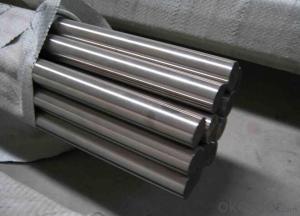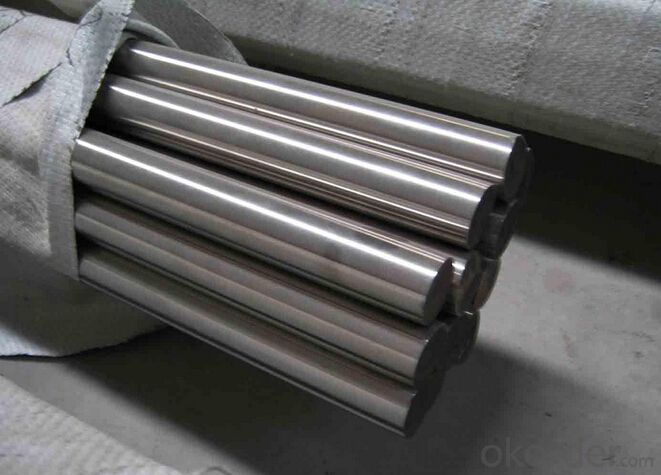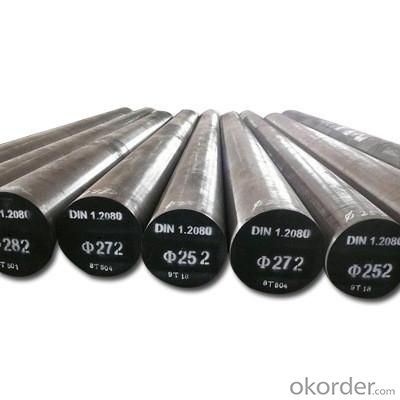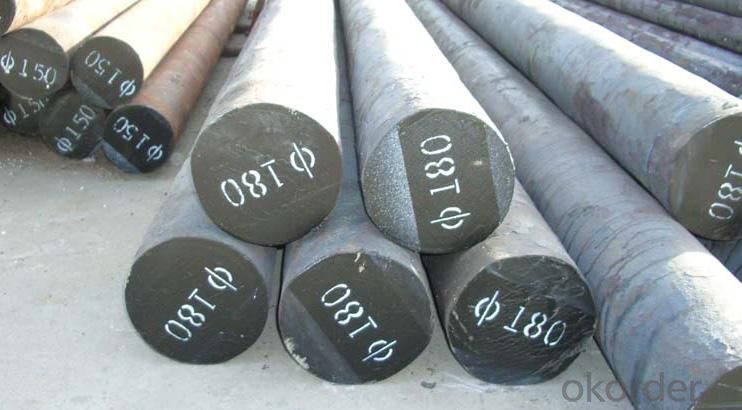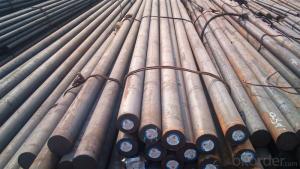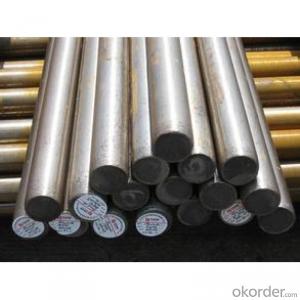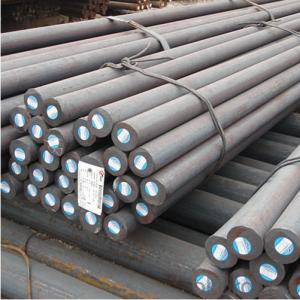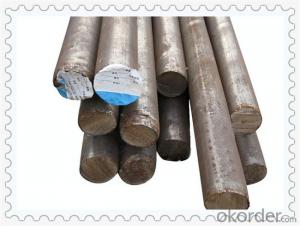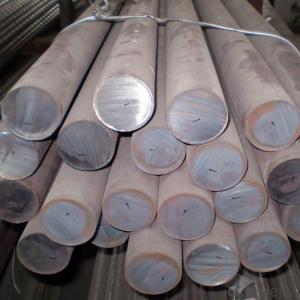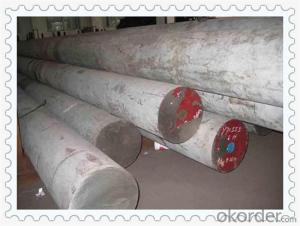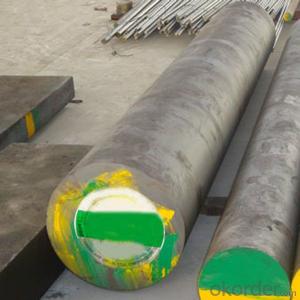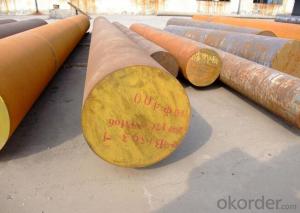42CrMo4 Alloy Structure Steel Round Bar
- Loading Port:
- China main port
- Payment Terms:
- TT OR LC
- Min Order Qty:
- 30 m.t.
- Supply Capability:
- 10000 m.t./month
OKorder Service Pledge
OKorder Financial Service
You Might Also Like
Specification
42CrMo4 Alloy Structure Steel Round Bar
Product Information:
Heat treatment
Soft Annealing: Heat to 780-810°C, cool slowly. This will produce a maximum Brinell hardness of 240.
Stress Relieving: Stress relieving to remove machining stresses should be carried out by heating to 650°C, holding for one hour at heat, followed by air cooling. This operation is performed to reduce distortion during heat treatment.
Hardening: Harden from a temperature of 1080-1160°C followed by air, oil or warm bath quenching. Hardness after quenching is 47-53 HRC.
Tempering :Tempering temperature: See the table bellow.
Tempering Temperature (oC) vs. Hardness (HRC)
Specification :
Size:round
Dia:18mm~220mm
Width:60mm-600mm
Heat treatment:Normalized ; Annealed ; Quenched ; tempered
Surface Condition:Black surface ; Grinded ; Machined
Delivery Condition:hot rolled ; cold drawn ; forged
Payment Terms:T/T;L/C
Trade Terms:FOB;CIF
Application:cold work die steel;hot work die steel;plastic die steel
Product Overviews:
| Product Name | Typical Grades | Diameter(mm) | Standard adopted |
| Carbon Steel | 20 (1020/S20C/C22) | Ø16-Ø300 | GB/SAE/JIS/DIN |
| 40 (1040/S40C/C40) | |||
| 45 (1045/S45C/C45) | |||
| Bearing Steel | GCr9 (51100/SUJ1) | Ø12-Ø250 | |
| GCr15 (52100/SUJ2/100Gr6) | |||
| GCr9SiMn (A485-Gr.1/SUJ3) | |||
| Cr-Mo Steel | 20Cr (5120/SCr420H/20Cr4) | Ø12-Ø250 | |
| 40Cr (5140/SCr440/41Cr4) | |||
| 42CrMo(4140/SCM440/42CrMo4) | |||
| Gear Steel | 20CrNiMo | Ø16-Ø600 | |
| 20CrMn(5115/SMnC420/20MnCr5) | |||
| 20CrNiMo(8620/SNCM220/20CrMiMo2) |
Product Show:

Our Advantages:
· Industry experience over 20 years.
· Shipment of goods -More than 70 countries worldwide.
· The most convenient transport and prompt delivery.
· Competitive price with best service.
· High technical production line with top quality products.
· High reputation based on best quality products.
With our experienced, enthusiastic and dynamic staffs, we assure to bring you the products with best quality, reasonable prices and good after-sales services under the motto: Friends First, Business After.
Communication, Experience, Expertise and Best efforts are our Promises to you.
- Q: How is shock-resistant steel used in the production of impact tools?
- Shock-resistant steel is used in the production of impact tools due to its exceptional ability to withstand high impact forces without deforming or breaking. This steel is specifically designed to absorb and distribute the energy generated during impacts, making it an ideal material for tools such as hammers, wrenches, and chisels. By using shock-resistant steel, manufacturers ensure that their impact tools can endure rigorous use and provide reliable performance, even in demanding applications.
- Q: How does special steel contribute to the durability of products?
- There are several ways in which special steel enhances the durability of products. Initially, special steel's notable qualities of high strength and hardness make it resistant to wear and tear. As a result, products constructed from special steel can endure heavy usage and outlast those made from regular steel or alternative materials. Moreover, special steel commonly incorporates other elements like chromium, nickel, and molybdenum, which heighten its resistance to corrosion. This is particularly crucial for products exposed to harsh environments or chemicals. The corrosion resistance of special steel aids in preventing rust and deterioration, thus increasing the product's lifespan. Additionally, special steel can undergo heat treatment to enhance its mechanical properties, including toughness and hardness. Through specific heating and cooling processes, heat-treated special steel becomes stronger, rendering it less susceptible to deformation and breakage. This is especially advantageous for products subjected to heavy loads or impacts. Furthermore, special steel is often manufactured with precise composition and microstructure, resulting in improved material properties. This encompasses superior fatigue resistance, implying that the material can endure repeated stress without developing cracks or breaking. Consequently, products made from special steel exhibit enhanced reliability and are less prone to failure. In conclusion, special steel significantly contributes to product durability through its high strength, corrosion resistance, improved mechanical properties, and superior fatigue resistance. By incorporating special steel into the manufacturing process, products can be designed to withstand various demanding conditions, ensuring a longer lifespan and greater reliability.
- Q: What are the applications of special steel in the railway industry?
- Special steel has several important applications in the railway industry. It is commonly used for manufacturing railway tracks, as it possesses high strength and durability, ensuring the tracks can withstand heavy loads and frequent use. Additionally, special steel is employed in the construction of railway bridges and tunnels, offering excellent resistance to corrosion and extreme weather conditions. Moreover, special steel is utilized in the production of railway components such as wheels, axles, and couplers, ensuring optimal performance, safety, and longevity of the railway system.
- Q: Is special steel suitable for manufacturing surgical instruments?
- Yes, special steel is suitable for manufacturing surgical instruments. Special steel is often used in the production of surgical instruments due to its high strength, corrosion resistance, and ability to maintain sharpness. It meets the stringent requirements of surgical procedures and ensures durability and reliability in medical settings.
- Q: How does special steel contribute to the manufacturing of fasteners?
- Due to its unique properties and characteristics, special steel is an indispensable material in the production of fasteners. Firstly, it possesses high strength and durability, making it perfect for manufacturing fasteners that must endure heavy loads and high levels of stress. This guarantees that the fasteners can securely hold components together without breaking or becoming loose over time. Additionally, special steel is renowned for its outstanding corrosion resistance. Fasteners are frequently exposed to diverse environmental conditions, such as moisture, chemicals, and extreme temperatures. The corrosion resistance of special steel helps prevent rust and deterioration, ensuring the longevity and dependability of the fasteners. Furthermore, special steel can be easily shaped, machined, and heat-treated, enabling the production of fasteners with precise dimensions and customized designs. This versatility in manufacturing processes allows for the creation of fasteners that can meet specific application requirements, including different thread types, sizes, and head styles. Moreover, special steel offers excellent wear resistance and hardness, which are crucial for fasteners subjected to repetitive movements or constant friction. The hardness of special steel helps the fasteners maintain their shape and integrity, reducing the risk of deformation or failure during operation. Overall, special steel plays a crucial role in fastener manufacturing by providing high strength, corrosion resistance, versatility in manufacturing processes, and excellent wear resistance. These properties ensure that fasteners are reliable, long-lasting, and capable of withstanding the demands of various industries, such as automotive, aerospace, construction, and machinery.
- Q: What are the main factors affecting the impact toughness of special steel?
- Various factors influence the impact toughness of special steel and other materials. The impact toughness of special steel can be affected by the following main factors: 1. Composition: The impact toughness of the steel is greatly influenced by its chemical composition. Adding elements like carbon, manganese, silicon, nickel, and molybdenum can enhance the toughness of the steel. Higher carbon content generally increases hardness but decreases toughness, while alloying elements like nickel and molybdenum can improve toughness. 2. Heat treatment: The impact toughness of special steel can be significantly altered by the heat treatment process, including quenching and tempering. Proper heat treatment can refine the steel's microstructure, making it more resistant to fractures and increasing its toughness. 3. Microstructure: The toughness of the steel is heavily influenced by its microstructure, including the size, shape, and distribution of its grains. Fine-grained steels generally exhibit better toughness compared to coarse-grained ones. The presence of certain phases, such as martensite or bainite, can also impact the impact toughness. 4. Inclusions: The presence of non-metallic inclusions, such as sulfides, oxides, or carbides, in the steel can act as stress concentration points and reduce its impact toughness. High-quality special steels often undergo processes like vacuum degassing or electroslag remelting to minimize these inclusions. 5. Processing conditions: The manufacturing processes used to produce special steel can affect its impact toughness. Factors like forging, rolling, or extrusion conditions, as well as the cooling rate during solidification, can impact the microstructure and, consequently, the toughness of the steel. 6. Temperature: The impact toughness of special steel varies with temperature. Some steels exhibit good toughness at low temperatures, while others perform better at higher temperatures. The temperature at which the steel is used or tested is an important factor to consider when evaluating its impact toughness. It is important to note that standardized tests, such as the Charpy or Izod test, are often used to determine the impact toughness of special steel. These tests involve subjecting a notched specimen to impact loading and provide valuable information on the steel's ability to absorb energy and resist fracture under impact conditions.
- Q: What are the specific requirements for special steel used in the food processing industry?
- The food processing industry has strict requirements for special steel due to its critical nature and the need for high levels of hygiene and safety. Some key requirements for special steel in this industry are as follows: 1. Excellent corrosion resistance: Special steel must be able to withstand exposure to food products, cleaning agents, and moisture without corroding. This is important to prevent contamination and ensure the longevity of equipment. 2. Hygienic design: Steel used should have a smooth and non-porous surface to prevent the accumulation of food particles, bacteria, and other contaminants. It should also be easy to clean and sanitize to maintain hygiene. 3. Non-reactivity: The steel should not react with food products, particularly acidic or alkaline items, to avoid any changes in taste or quality. 4. High temperature resistance: Special steel should be able to withstand high temperatures during cooking, sterilization, and baking processes without any adverse effects on the food or equipment. 5. Sufficient mechanical strength: The steel should have enough strength to withstand the stresses and strains of food processing operations, such as impacts and vibrations, without deforming or breaking. 6. Compliance with food safety regulations: Special steel must meet relevant food safety regulations and standards. It should be free from harmful substances that can leach into the food, such as lead and cadmium. 7. Traceability: Special steel used in the industry should be traceable with proper documentation and certification to ensure its origin and quality. This helps maintain transparency and accountability in the supply chain. These requirements ensure that special steel used in the food processing industry meets the highest standards of quality, hygiene, and safety, protecting consumers' health and maintaining the integrity of food products.
- Q: What are the different non-destructive testing methods used for special steel?
- Some different non-destructive testing methods used for special steel include ultrasonic testing, magnetic particle testing, liquid penetrant testing, radiographic testing, and eddy current testing. These methods help to detect and evaluate any defects or abnormalities in the steel without causing any damage to the material.
- Q: What are the applications of corrosion-resistant steel?
- Corrosion-resistant steel has a wide range of applications in various industries. It is commonly used in the construction of buildings, bridges, and infrastructure in coastal areas or places with high humidity, as it can withstand exposure to corrosive elements like saltwater and moisture. It is also utilized in the automotive and aerospace industries, where it provides durability and longevity to components exposed to harsh environments. Additionally, corrosion-resistant steel is extensively used in manufacturing equipment and storage tanks for chemicals, pharmaceuticals, and food processing, as it ensures the integrity and safety of these materials.
- Q: Can special steel be coated or plated?
- Yes, special steel can be coated or plated. Coatings or platings are often applied to special steel to enhance its corrosion resistance, improve its appearance, or provide additional properties such as increased hardness or lubricity. These coatings can be achieved using various methods such as electroplating, hot-dip galvanizing, powder coating, or physical vapor deposition.
Send your message to us
42CrMo4 Alloy Structure Steel Round Bar
- Loading Port:
- China main port
- Payment Terms:
- TT OR LC
- Min Order Qty:
- 30 m.t.
- Supply Capability:
- 10000 m.t./month
OKorder Service Pledge
OKorder Financial Service
Similar products
Hot products
Hot Searches
Related keywords
